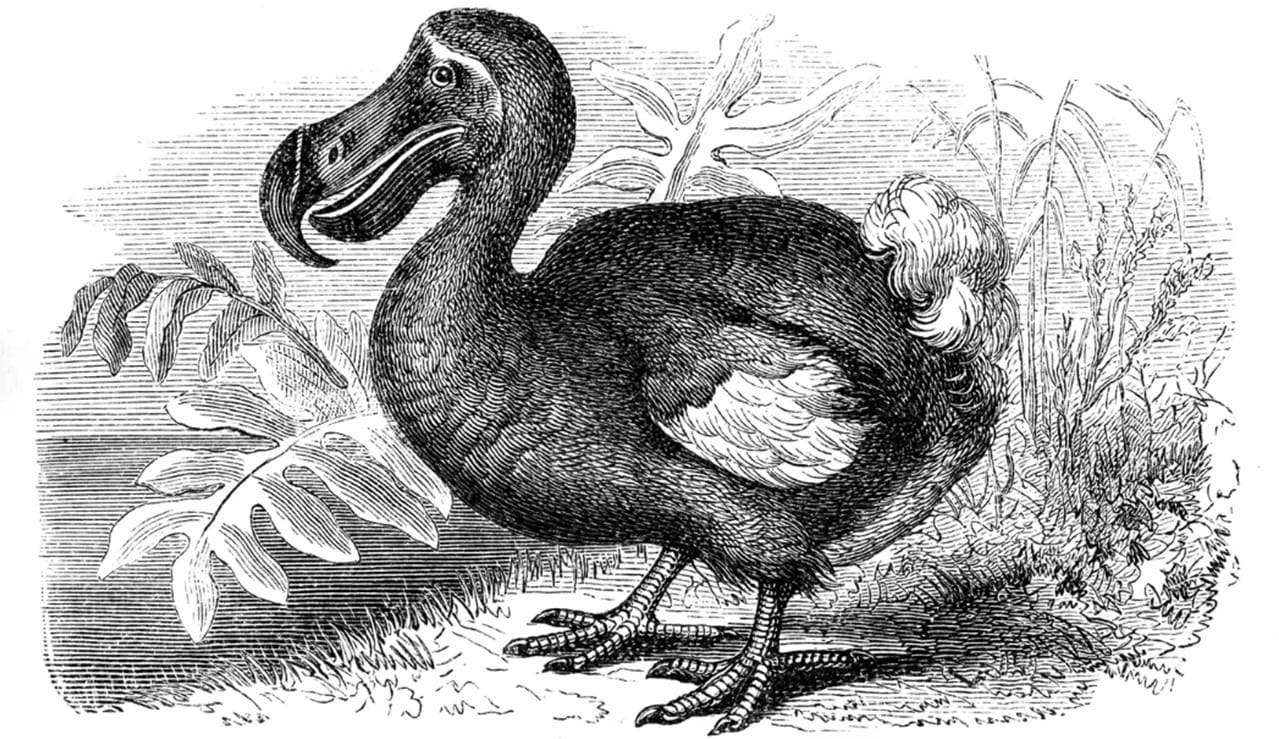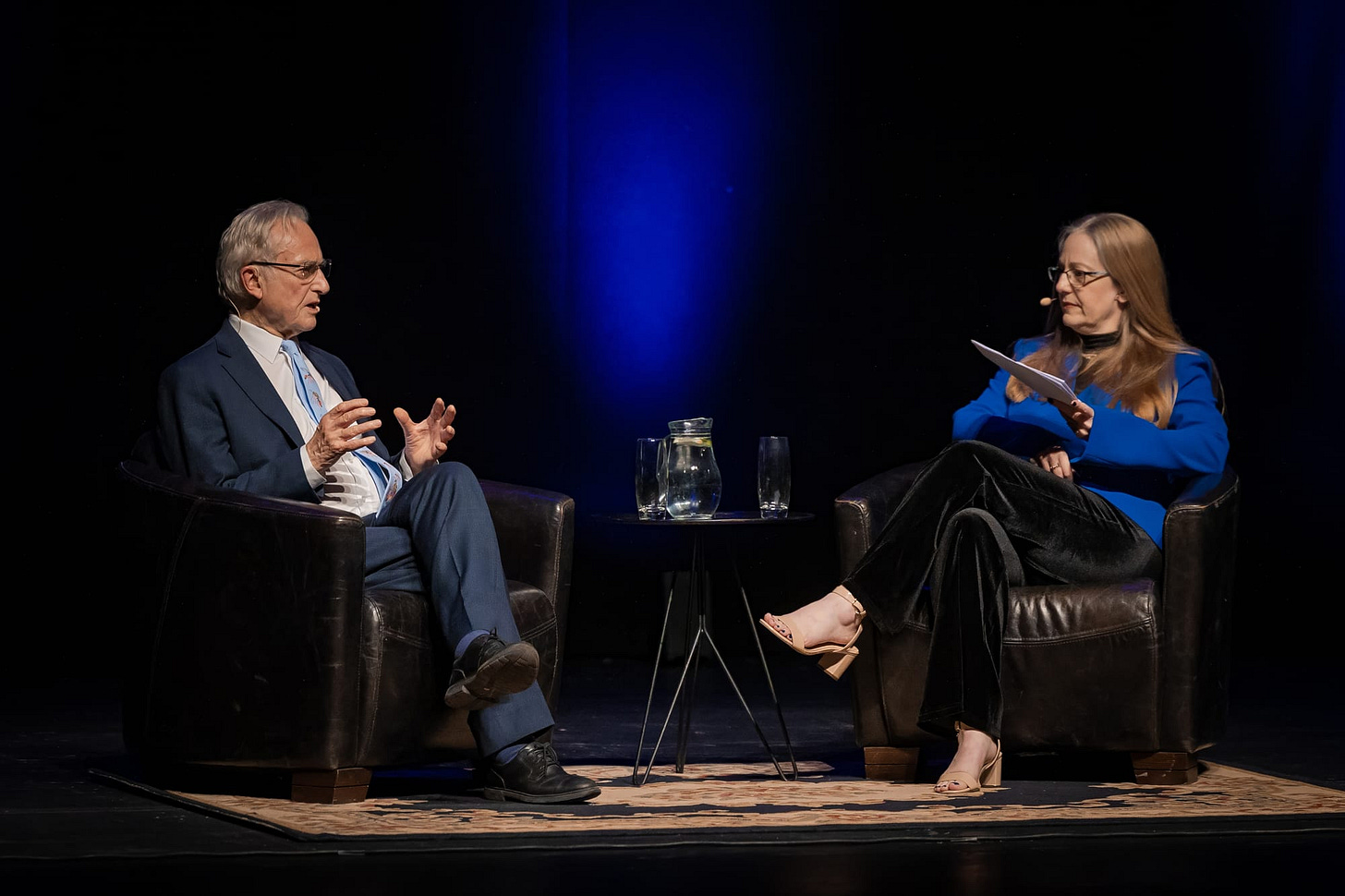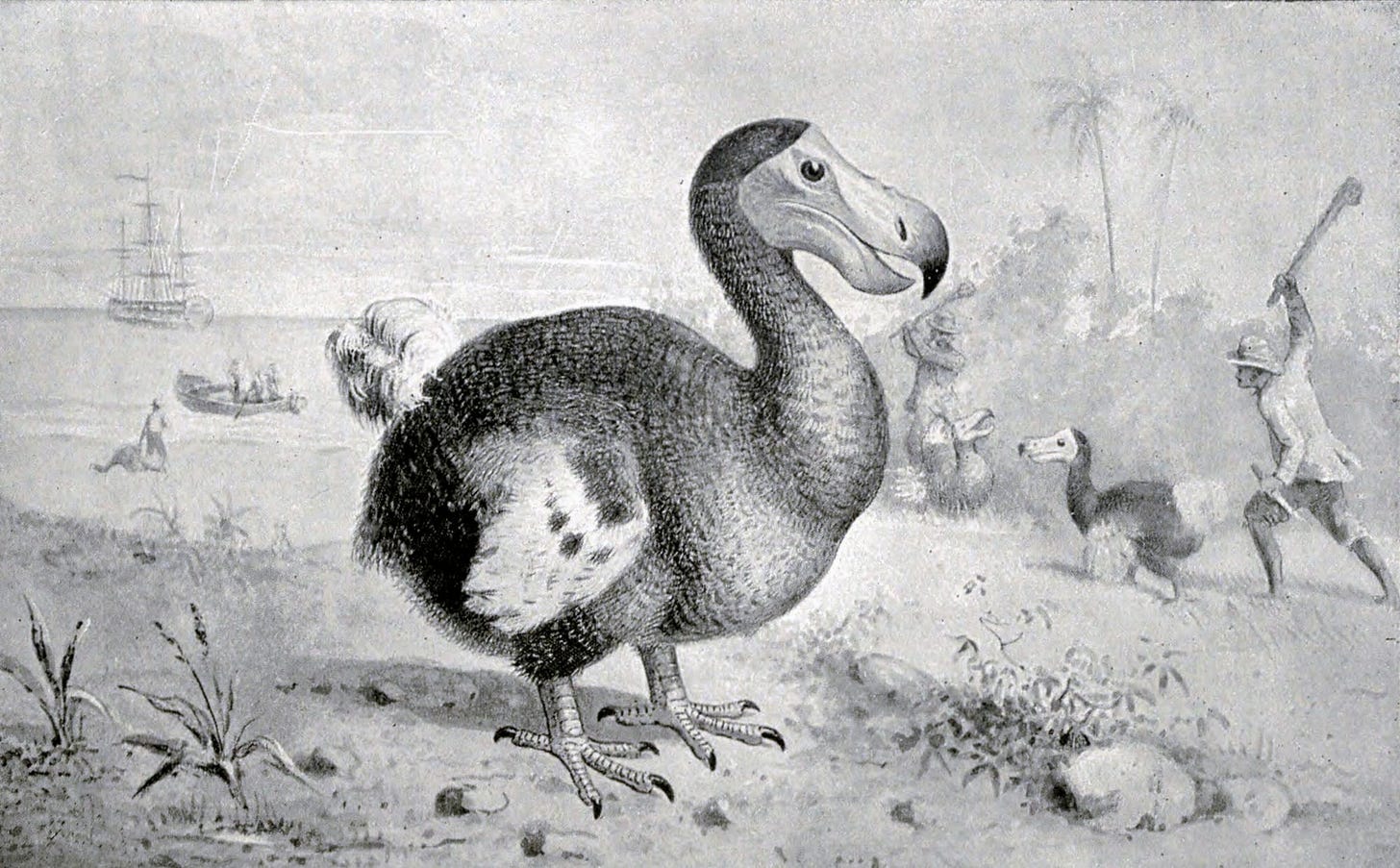Survival of the fittest
What evolution tells us about why the gender-critical side has all the best arguments
Thanks all for the lovely responses to my speech in Berlin on the day Germany introduced gender self-ID – I’ve been very touched. It was a great trip, not just the protest outside the Bundestag and a dinner with various of the organisers, but a book reading on the following day and lots of great conversations. It was then straight into the event with Richard Dawkins in Manchester, so an exhausting weekend, but very exciting and lots of fun.
If you are not a subscriber to my newsletter, you might like to sign up for free updates. I hope that in the future you might consider subscribing.
The Dawkins event was filmed, as all the events in his farewell tour have been. Apparently they are going to be released on his YouTube channel, but they’ll be drip-fed over time since there were something like 25 or 30 separate shows, so all at once would be a bit much. I’ll share mine once it’s out.
As I said in my introduction on the night, what makes Dawkins’ writing special isn’t just that it’s fully comprehensible to lay people without being dumbed down – though it certainly is that. And it isn’t just that the writing is beautiful – though again, it really is beautiful.
It’s that each book consists of one big, easily stated, deceptively simple idea – often the title, often just three words. “The Selfish Gene”. “The Extended Phenotype”. “Climbing Mount Improbable”. “Unweaving the Rainbow”. And then he proceeds to explain the many surprising, beautiful and powerfully explanatory consequences of that idea. Without ever losing his thread, and without being lofty or otherworldly, he sustains his overarching message – everything he tells you, he illustrates. Those illustrations are witty, funny, beautiful, sometimes awe-inspiring, sometimes sad, always memorable. They’re never detail for detail’s sake, but always capitalising on his eye for the story he’s trying to tell, the example that gets his point across.
And he’s never dry or aloof – his subject matter always combines the big question – Douglas Adams’s “Life, The Universe and Everything” one – why are we here? – and the substance: the grit, the fine detail – what is it like being here? His books have an intellectual self-confidence that carries the reader forward seemingly effortlessly, and it’s contagious. It’s not just good writing, it’s good thinking. He makes his readers not just better informed but smarter too. He’s not afraid to speculate – lots of his books finish with a big, bold idea, a provocation if you will, that gives the reader a fresh way to think about and understand the world.
It’s invidious trying to find a favourite quote for such a good and prolific writer, but to round off my introduction before inviting him on stage and starting the interview I chose this one, from “Unweaving the Rainbow”, which came out in 1998 and which I read as soon as it came out. Judging from online compilations of quotes, it’s a lot of people’s favourite. I was actually a little afraid I’d choke up reading it out, but thankfully managed not to.
“We are going to die, and that makes us the lucky ones. Most people are never going to die because they are never going to be born. The potential people who could have been here in my place but who will in fact never see the light of day outnumber the sand grains of Arabia. Certainly those unborn ghosts include greater poets than Keats, scientists greater than Newton. We know this because the set of possible people allowed by our DNA so massively exceeds the set of actual people. In the teeth of these stupefying odds it is you and I, in our ordinariness, that are here. We privileged few, who won the lottery of birth against all odds, how dare we whine at our inevitable return to that prior state from which the vast majority have never stirred?”
I think about evolution a lot, and have done ever since I first learned – from Dawkins’ books, in fact – how powerfully explanatory an idea it is. Many of the people who understand that the differences between the sexes are real and significant – sufficiently so that enormous problems arise from pretending they don’t exist, or ignoring them in the service of accommodating some people’s desire to be treated as if they have changed sex – think those differences are God-given. As an atheist I think they’re bestowed by evolution, and that evolutionary thinking, especially the gene’s-eye view espoused by Dawkins, helps us to understand what those differences are and how best to build a world that is fit for both men and women.
But reading Dawkins’ latest book, “The Genetic Book of the Dead”, preparing for the show and thinking about it afterwards meant I was thinking about evolution even more than normal. This led to an insight that cheered me up quite a lot, and which I think it’s worth sharing.
It starts from the observation that evolutionary processes can endow species with seemingly miraculous powers. “Selection pressures” – the difficulties of surviving and reproducing in hostile environments, avoiding predators, winning against the competition for food and mates and all the rest – ruthlessly weed out underperformance and hone abilities generation by generation. Thus we arrive at species that can perform marvels, like the golden eagle, which can spot a mouse from two miles away, and sharks that can detect blood in the water at one part per million – Google tells me that’s roughly one drop in an Olympic-sized swimming pool.
This is the idea of one of Dawkins’ book titles, “Climbing Mount Improbable”: one imperceptible step after another brings you to a summit that genuinely looks unconquerable. Especially when you fully internalise the fact that there is no animating spirit directing the whole thing – in another of Dawkins’ book titles, evolution is “The Blind Watchmaker”.
When the environment changes, however, so that the selection pressures are removed, evolution-endowed abilities very quickly degrade. The descendants of animals that move underground lose their sight; the descendants of those washed up on isolated islands with few or no predators and plenty of food become slower and less fearful. The classic example is of course the dodo, which was docile and flightless by the time Dutch sailors landed on Mauritius in 1598.
This article frames the dodo’s extinction as caused by humans – and it was, sure, but any newly arrived predator would have had the same effect. The more important point is that having lived through many, many generations with plentiful food and no predators, by the time humans arrived the dodo had lost the abilities that might have enabled it to cope.
This happens because random variation means individuals in each generation vary, and when a particular ability no longer conveys an advantage, individuals who are subpar in that respect don’t get weeded out or suffer a reproduction penalty compared with individuals who outperform. Indeed, if the ability is at all costly – and evolution is exquisitely sensitive to “costs” that seem minor, even trivial – individuals who are subpar are likely to do better. Examples of costly abilities are ones that require resources to build, maintain or use – like the wings and muscles needed for flight – or that handicap the animal in a way that is no longer compensated for. Think of how easily animals with natural predators startle: useful when there are predators around but actively harmful when there aren’t, since startling is an interruption and distraction from useful activities like eating or trying to attract a mate.
Well, for at least a decade and maybe longer, it’s been extremely dangerous to challenge any of the fatuous nonsense spewed out by transactivists. Even now that we are finding it a bit easier to get our arguments heard, they aren’t listening; they’re still in the epistemic bubbles they have been inhabiting for much longer than they have managed to enforce “no debate”.
And the result is that their intelligence and moral compasses have degraded; neither are necessary in their circles to survive or thrive. Unchallenged by any performance standards whatsoever and showered with government funding and research grants, they spend their days spewing out witless arguments and absurd research. They’re like dodos puttering around Mauritius, except without the bumbling charm.
Actually, transactivists aren’t merely insulated from the pressures that would normally lead them to come up with better policies and arguments; they’re subjected to pressures that actively produce nonsense and reward them for strategic ignorance. When you’re determined to arrive at ludicrous conclusions and to promote vicious ideologues, decent evidence and arguments only get in your way. All the pressures are towards mystification, misrepresentation, bluster and outright lies. It’s as if dodos hadn’t just been left to evolve in an unchallenging environment, but the cost of maintaining flight and fearfulness had risen precipitously at the same time.
Consider this forthcoming book claiming that getting rid of the female category entirely would be good for female athletes. The sheer stupidity of the thesis wouldn’t survive first contact with the arguments presented by people like Emma Hilton, Ross Tucker and Tommy Lundberg, who have had to fight to get a single word published against biased journal editors and reviewers, and who have therefore had to seek ever more irrefutable evidence, and to make every step in their arguments ever more watertight. I don’t know Lundberg personally, but I have chatted with Ross a fair bit since I interviewed him for my book, and of course follow his witty and informative Twitter account. I know Emma well – she’s a trustee of Sex Matters. And so I can testify to the ingenuity, effort and tenacity with which all three have overcome obstacles and navigated an incredibly hostile research and publishing environment.
Even as the transactivists have sat inside their epistemic bubble allowing their faculties to degenerate, our side has experienced extreme selection pressures. An example is the way we get attacked by bad-faith actors if we say anything even remotely inviting of misrepresentation – the way I’m falsely accused of being antisemitic, for example, or of wanting all trans-identifying people dead.
I cannot tell you how hard I try with my words. I still occasionally screw up, but my speech is far more careful and skilful on this subject than on any other I’ve ever discussed. And the individuals within “GC Inc” are a demanding and argumentative audience too! I’m forever honing my message: trying different expressions and analogies to see what lands; tweaking my words to make them as hard as possible to misunderstand; making everything as simple as I can and no simpler.
Well, the day is coming when transactivists will no longer be able to remain ensconced within their epistemic bubble. Indeed, some of them have already been forced out into the real world by court cases, where you can’t refuse to answer a question in cross-examination or accuse anyone who disagrees with you of being a bigot, let alone flounce off. And it’s simply amazing how poorly they perform. In the employment-tribunal cases taken by Roz Adams, Jo Phoenix, Rachel Meade and others, they have been no more nimble than the dodo.
Or consider the one and only big interview given by Iain Anderson during his short stint as chair of Stonewall. The interviewer, Beth Rigby, makes absolute mincemeat of him. For a flagship interview like this on pretty much any other topic, the interviewee would have prepared by working through every possible hostile question their media advisors could think of, practising rebuttals and counter arguments, and deciding when to make strategic concessions and when to respond by going on the offensive.
Instead, you can see Anderson try platitudes, circular arguments and thought-stopping cliches that presumably played well in Stonewall’s boardroom, where saying “hang on, normies think that sounds insane” would be a fast track to being fired. Subjected to quite normal and predictable questioning by Rigby, he’s a sitting dodo. The result of “no debate” is people who simply cannot defend or even make their own arguments.
I’m sure that at least some people on their side are belatedly becoming aware that they are laughably underpowered against us. But you can’t become a high performer by sheer force of will. Species climb Mount Improbable only because they are forced to: by hunger, predation and the unending fight to mate. Every living creature today is the descendant of an unbroken line of ancestors, every one of whom survived long enough to reproduce, going back more than four billion years. If they hadn’t successfully risen to one tough challenge after another, we’d be amoebas still.
If you are signed up for free updates or were forwarded this edition of Joyce Activated, and you would like to subscribe, click below.
Lastly, here’s my latest Critic column: reflections inspired by the heroic Gisele Pelicot on how consent, essential though it is, can’t bear all the weight that is now being put on it.




